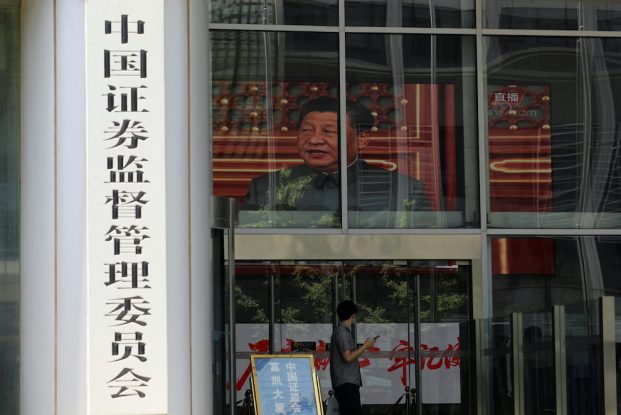Chinese regulators are looking into quantitative trading strategies of some hedge funds and brokerages amid public anger over the country’s flat stock markets, sources say.
The weak performance of local markets, which have been weighed down by the country’s economic slowdown and an exodus by foreign investors, has stirred anger about the difficulty of making money in the sector amid share price falls and volatility.
The China Securities Regulatory Commission (CSRC) has checked with several major brokers over the past weeks about short-selling activities and trading strategies of their quant clients – funds that trade rapidly using derivatives and data-driven computer models, two people with direct knowledge of the probe said.
ALSO SEE: Toshiba to Delist After $13.5bn Takeover by JIP and Allies
Separately, the Shanghai and Shenzhen stock exchanges, under the CSRC’s guidance, have sought information from major quant funds on their money-making strategies, another source said.
“They want to know the logic of the trading (strategy), the source of the profit; under which situation you hold net long, or net short positions … and the reason behind buy and sell orders,” the source said.
The sources declined to be named as they are not authorised to speak to media. The CSRC and the bourses didn’t respond to requests for comment.
Global quant fund houses including Winton and Two Sigma have operations in China, but it’s not clear if the foreign players are being probed.
The latest regulatory scrutiny comes after a slew of market-friendly measures – including a stamp duty cut – failed to drive a sustainable rally in a struggling market that is down roughly 5% year-to-date.
The weakness has triggered finger-pointing in social media, as well as criticism from fund managers and retail investors against these quant funds and short sellers.
Concern on possible tighter regulations on short-selling
The CSRC had earlier this month vowed to increase scrutiny over programme trading, and some fear fresh probes could lead to tighter regulations on short-selling and certain financing activities by hedge funds.
The regulatory review is not without precedent. During China’s 2015 market crash, Beijing almost shut down the index futures market and blamed shortsellers for the turmoil.
PROBE Quant funds in China exceeded 1.08 trillion yuan ($147.94 billion) at the end of 2021, nearly doubling in size from a year earlier, according to a report compiled by institutions including Huatai Securities.
Some of China’s biggest quant funds include High-Flyer Quant Investment, Yanfu Investments LLC and Shanghai Minghong Investment Management Co.
A better understanding of various quant strategies may lead to regulators curbing those that contribute to market volatility, said one of the brokerage sources. Short-selling activities by quant funds could also be caught in the crossfire, he said.
“Brokerages in China are more willing to lend securities to quants for shortselling due to their active trading and commission contributions. But it’s unfair to other market players who hardly have access to securities lending,” Yuan Yuwei, fund manager at Water Wisdom Asset Management, said.
The regulatory inquiry is still in its early stage and no conclusion has been made, three of the sources said.
‘Providing liquidity to bad guys’
Regulators have also asked for data around Direct Market Access (DMA), sources said. Through DMA, hedge funds in China can borrow money from brokerages to fund leveraged bets. Borrowing $1 only requires a minimum of 25 cents in deposits.
“DMA easily raises eyebrows as it involves high leverage, and allows quant funds to make a lot of money,” a brokerage source said.
Another brokerage source said the CSRC asked them to elaborate on the size of their quant clientele and whether quant trading had impacted recent stock market.
Yang Tingwu, vice general manager of asset manager Tongheng Investment, supports tighter rules for quant funds, arguing many Chinese quants make lucrative bets on poorly managed companies based on momentum signals, rather than fundamentals.
Quant strategy is a neutral tool, but “in China, it’s being used to provide liquidity to the bad guys,” he said, referring to listed firms with poor governance.
- Reuters with additional editing by Jim Pollard
ALSO SEE:
China Central Bank in Investment Talks with JPMorgan, HSBC
Shanghai Exchange Looking at Nickel Futures, May Rival LME
China Slashes Stamp Duty on Stock Trades Starting Monday
China’s Deleveraging Overdue, Debt Freezing the Economy: Dalio
























